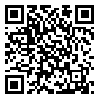Volume 7, Issue 2 (Spring 2019)
PCP 2019, 7(2): 137-146 |
Back to browse issues page
Download citation:
BibTeX | RIS | EndNote | Medlars | ProCite | Reference Manager | RefWorks
Send citation to:



BibTeX | RIS | EndNote | Medlars | ProCite | Reference Manager | RefWorks
Send citation to:
Khazaeili M, Zargham Hajebi M, Mohamadkhani P, Mirzahoseini H. The Effectiveness of Mindfulness-Based Internet Intervention on the Anxiety, Depression, and Fatigue of the Patients With Multiple Sclerosis. PCP 2019; 7 (2) :137-146
URL: http://jpcp.uswr.ac.ir/article-1-626-en.html
URL: http://jpcp.uswr.ac.ir/article-1-626-en.html
1- Department of General Psychology, Faculty of Human Sciences, Qom Branch, Islamic Azad University, Qom, Iran.
2- Department of Clinical Psychology, University of Social Welfare and Rehabilitation Sciences , Tehran, Iran.
2- Department of Clinical Psychology, University of Social Welfare and Rehabilitation Sciences , Tehran, Iran.
Abstract: (5853 Views)
Objective: Multiple Sclerosis (MS) is one of the prevalent autoimmune diseases that affects the central nervous system. It is a chronic neurological disorder that progresses to physical inability and cognitive abnormalities restricting the individual’s ability to function independently. The problems of MS patients significantly affect their psychological well-being. Considering the problems of MS patients, like commuting, traffic, and long distances to health centers, weather conditions, and enormous time and costs they spend on seeking health services, remote psychological intervention is an alternative and advisable choice. This study aimed to investigate the effect of a Mindfulness-Based Intervention (MBI) via a web conferencing application on the reduction of anxiety, depression, and fatigue of patients with MS.
Methods: This is a pre-test post-test quasi-experimental study with a control group. A total of 30 female patients with relapsing-remitting MS, who met the inclusion criteria were selected through purposeful sampling method from the members of the MS Society in Tehran and Qom cities in 2017. They were randomly divided into experimental (n=15) and control groups (n=15). The two groups completed Beck anxiety inventory, Beck depression inventory, and fatigue Inventory online in three stages (before the intervention, after the intervention, and one-month follow-up after intervention). The experimental group received eight 2-h sessions of MBI via a web conferencing software, while the control group received no intervention. For analyzing the collected data, repeated-measures multivariate analysis of variance was performed in SPSS V. 23.
Results: There was a significant difference between the two groups in the post-test scores of anxiety (F=50.277, P≤0.001, η2=0.642), depression (F=73.680, P≤0.001, η2=0.725), and fatigue (F=111.086, P≤0.001, η2=0.799). MBI significantly reduced the anxiety and depression and fatigue in the experimental group.
Conclusion: MBI is effective in reducing anxiety, depression, and fatigue of MS patients. This therapy can be applied as an effective method to improve the quality of life of MS patients.
Methods: This is a pre-test post-test quasi-experimental study with a control group. A total of 30 female patients with relapsing-remitting MS, who met the inclusion criteria were selected through purposeful sampling method from the members of the MS Society in Tehran and Qom cities in 2017. They were randomly divided into experimental (n=15) and control groups (n=15). The two groups completed Beck anxiety inventory, Beck depression inventory, and fatigue Inventory online in three stages (before the intervention, after the intervention, and one-month follow-up after intervention). The experimental group received eight 2-h sessions of MBI via a web conferencing software, while the control group received no intervention. For analyzing the collected data, repeated-measures multivariate analysis of variance was performed in SPSS V. 23.
Results: There was a significant difference between the two groups in the post-test scores of anxiety (F=50.277, P≤0.001, η2=0.642), depression (F=73.680, P≤0.001, η2=0.725), and fatigue (F=111.086, P≤0.001, η2=0.799). MBI significantly reduced the anxiety and depression and fatigue in the experimental group.
Conclusion: MBI is effective in reducing anxiety, depression, and fatigue of MS patients. This therapy can be applied as an effective method to improve the quality of life of MS patients.
Keywords: Mindfulness-base, Internet, Intervention, Multiple Sclerosis, Anxiety, Depression, Fatigue
Type of Study: Applicable |
Subject:
Cognitive behavioral
Received: 2018/12/17 | Accepted: 2019/06/18 | Published: 2019/06/18
Received: 2018/12/17 | Accepted: 2019/06/18 | Published: 2019/06/18
| Rights and permissions | |
 |
This work is licensed under a Creative Commons Attribution-NonCommercial 4.0 International License. |







